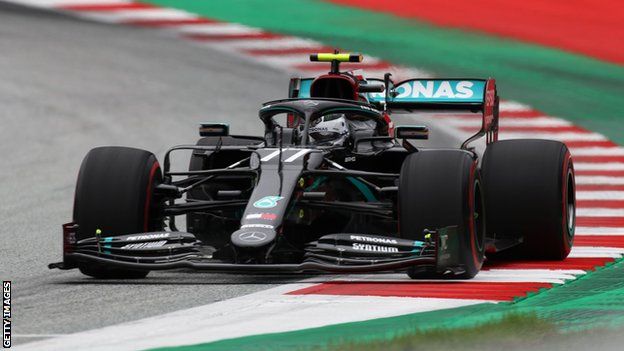Austrian GP: Formula 1 drivers to wear 'end racism' T-shirts
- Published

Mercedes are running a new black livery for the 2020 season
The Formula 1 drivers are planning to make a collective public stance against racism before Sunday's Austrian Grand Prix.
All 20 drivers will wear and display T-shirts saying "End Racism".
The drivers met on Friday evening in Austria and were unanimous in their support for anti-racism and the need for increased diversity in motorsport.
But there were differing opinions as to whether they should take a knee on the grid before the race.
About five drivers are said by insiders to have misgivings about the gesture.
It is possible that the drivers unsure about taking a knee will change their minds before the event.
A statement from the GPDA said: "The Grand Prix Drivers' Association has held a number of virtual meetings with all 20 F1 drivers to agree how best to show their collective support for the fight against racism ahead of this weekend's Grand Prix.
"All 20 drivers stand united with their teams against racism and prejudice, at the same time embracing the principles of diversity, equality and inclusion and supporting F1's commitment to these.
"Together the drivers will all show their public support for this cause on Sunday ahead of the race, recognising and respecting that each individual has the freedom to show their support for ending racism in their own way and will be free to choose how to do this ahead of the race start on Sunday."
GPDA chairman Alexander Wurz said he did not want to comment further because meetings were confidential.
Taking a knee has different associations in some countries, an issue within a group of drivers from nations with diverse societies and political cultures.
In global sport, it originated in the NFL as players, initially Colin Kaepernick, knelt during the US national anthem to call attention to issues surrounding racial equality and police brutality.
The gesture has become associated with the Black Lives Matter movement, which has led to global protests against racism and police brutality following the death in the United States of George Floyd, an unarmed black man, while a police officer knelt on his neck.
Premier League players took the knee before the first round of fixtures after a 100-day suspension of the season during the coronavirus pandemic.
They also wore "Black Lives Matter" on the back of their shirts and a specially designed logo on their sleeves.
The Premier League has said this was to send a message that it was unacceptable to treat black people differently to anyone else - and not an endorsement of a political movement.
A political group called Black Lives Matter, founded in 2013, has several goals including advocating against white supremacy and police violence towards black people.
The UK Twitter account of the group has caused controversy over the last week with tweets about Palestine and defunding the police.
Meanwhile, some of the drivers have also privately expressed unhappiness with what they saw as the accusatory tone of some of Lewis Hamilton's comments on the issue of anti-racism.
Last month, Hamilton accused other senior figures in F1 of not speaking out on racism in the wake of the protests following the death of George Floyd.
Hamilton wrote on Instagram: "I see those of you who are staying silent, some of you the biggest stars yet you stay silent in the midst of injustice."
After that, a number of leading drivers did speak out to voice their support for anti-racism, particularly Ferrari's Charles Leclerc, Renault's Daniel Ricciardo, McLaren's Lando Norris and Carlos Sainz and Williams' George Russell.
Hamilton, F1's first and only black driver, said this week that his remarks had not been directed at his fellow drivers.
"Ultimately people perceived it as I was targeting drivers," he said. "I really wasn't. It was targeted at the whole industry.
"It has been something I have been aware of for a long, long time and not seeing people do anything about it.
"If you are not a part of encouraging people to get out and understand why we're in this situation and what it is and why we're in it, that is frustrating.
"People being silent is something I have experienced for such a long time. But now is not the time to be silent. This is the time to spread the message. This is the time to pull together.
"We need as many voices as we can to push for change. We are all the same race. The perception is we are divided by colour and religion and all the different things. We are the same race but it is not reflected in society and how people are treated."